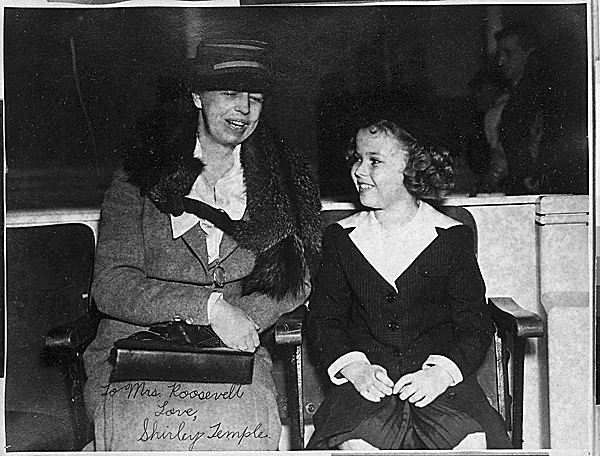The Honorable Shirley Temple Black and Family
Explore Further
December 2019 - Shirley’s Army Supports NMAD in Annual Pin Sale. Learn More
November 2019 - The Family of the Honorable Shirley Temple Black Gives Major Gift to the National Museum of American Diplomacy. Learn More
Biography
As a unique personification of Hollywood and the American movie, child star Shirley Temple radiated sheer joy and hope—raising the spirits of her fellow citizens as they struggled together through the Great Depression. President Franklin Delano Roosevelt proclaimed, “as long as our country has Shirley Temple, we will be all right.” Her vibrant and wholesome persona—revealed through starring roles in over 40 major motion pictures—had an undeniably positive impact on the well-being and value systems for generations worldwide.
After beginning 55 happy years of marriage to the love of her life, Charles Black, Shirley concentrated on raising their three young children while giving generously of herself in promoting the welfare of her community. Her involvement with young people’s health issues, in particular, was significant. She later returned to performing, starring in 50 primetime television productions aimed at the entertainment and development of children.
At the mid-point of her working life, Shirley acted on her heartfelt concern for the human condition by dedicating herself to public service. Through various US government assignments within the United Nations and in other domestic or bilateral contexts, she worked energetically to address national and international environmental-quality imperatives calling for effective solution.
With her decision to openly share the news of her 1972 mastectomy, Shirley stimulated an unprecedented public discussion of breast cancer and its early detection and treatment. She received over 50,000 cards and letters thanking her for making it more acceptable and less fearsome for women to seek appropriate medical attention. Undoubtedly, many more women and their loved ones have been touched and similarly encouraged by her selfless example.
Continuing with public service and building on her iconic image, Shirley served in a succession of senior diplomatic assignments promoting the national interest and representing America’s values and culture to other peoples and societies. As US ambassador to Ghana, her previous groundbreaking on-screen collaborations with Bill “Bojangles” Robinson had already introduced her to these West Africans as a “childhood friend.” She was the first woman to serve as US chief of protocol, the first-ever honorary US Foreign Service officer, and wrote her best-selling autobiography Child Star. Her seminal experiences in Czechoslovakia in August 1968—while Warsaw Pact forces invaded to crush the blossoming of freedom—enhanced her effectiveness 20 years later as US ambassador to Czechoslovakia during pivotal years of revolution and reform. She was a natural at this—after all, as a child, she was the world’s best-known ambassador of goodwill.
Today, child star Shirley Temple still captivates and enriches generations of viewers whenever and however they encounter her films. She embodies the American spirit through song, dance, comedy, and drama. And in a distinguished diplomatic career over more than two decades under four US Presidents, Ambassador Shirley Temple Black continued to open her heart and work hard to make a difference in so many lives around the world.









